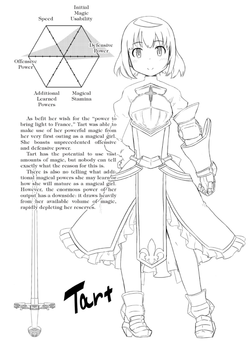Tart
This section is in need of attention.
The following section does not fit satisfactory wiki standards. It may be missing information, containing unconfirmed speculation outside of the speculation section, or have information that is outdated, in need of a rewriting, condensing, expansion, etc. If you wish to help fix up this section, please contribute on the editing page here.| Tart/Jeanne d'Arc | |
|---|---|

| |
| Japanese Name | ジャンヌ・ダルク |
Tart (タルト Taruto), also known as Jeanne d'Arc (ジャンヌ・ダルク Jan'nu Daruku) is the protagonist of Puella Magi Tart Magica: The Legend of "Jeanne d'Arc".
General info
Physical features
- Eye colour: Green
- Hair colour: Blonde.
Other
- Soul gem: A cross located on her chest.
- Weapon: Magically Composed Sword
- Wish: To have the Power to Bring light to France.
- Witch Form: La Pucelle de Blancheur (spinoff-exclusive)
- Japanese pronoun: watashi (私)
- Known relatives: Jacques d'Arc (Father), Isabelle d'Arc (Mother), Jacquemin, Jean and Pierre d'Arc (Older Brothers) and Catherine d'Arc (younger sister).
Powers
Observations
- She is known as Jeanette by her friends and family, and referred to as 'La Pucelle' by the French soldiers and officials. The later is a shortened version of 'La Pucelle d'Orléans' (The Maid of Orléans), a common nickname for Joan of Arc. On it's own, 'La Pucelle' can be translated as "The Maiden".
Etymology
In the English language her first name has been repeated as Joan since the fifteenth century because that was the only English equivalent for the feminine form of John during her lifetime. Her surviving signatures are all spelled Jehanne without surname. In French her name is today always rendered as Jeanne d'Arc, reflecting the modern spelling of her first name. The surname of Arc is a translation of d'Arc, which itself is a nineteenth-century French approximation of her father's name. Apostrophes were never used in fifteenth-century French surnames, which sometimes leads to confusion between place names and other names that begin with the letter D. Based on Latin records, which do reflect a difference, her father's name was more likely Darc. Spelling was also phonetic and original records produce his surname in at least nine different forms, such as Dars, Day, Darx, Dare, Tarc, Tart or Dart.
To further complicate matters, surnames were not universal in the fifteenth century and surname inheritance did not necessarily follow modern patterns. Joan of Arc testified at her trial that the local custom in her native region was for girls to use their mothers' surname. Joan's mother was known both as Isabelle Romée and Isabelle de Vouthon. No surviving record from Joan's lifetime shows that she used either her mother's or her father's surname, but she often referred to herself as la Pucelle, which roughly translates as the Maiden. Prior to the mid-nineteenth century, when Jeanne d'Arc and Joan of Arc became standard, literature and artistic works that refer to her often describe her as la Pucelle or the Maid of Orléans. Her native village has been renamed Domrémy-la-Pucelle in reflection of that tradition.
See [1]